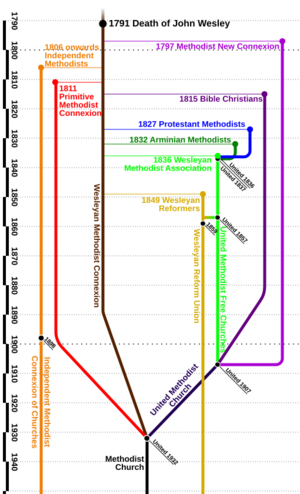Protestant Methodists facts for kids
The Protestant Methodists were a small Methodist church group. They were mostly based in Leeds, a city in England. This group broke away from the main Methodist Church in 1827.
Contents
What Were the Protestant Methodists?
The Protestant Methodists were a group of people who followed the Methodist faith. They decided to form their own church because they disagreed with some decisions made by the main Methodist leaders. They officially became a separate group in 1828.
The Organ Dispute in Leeds
The main reason the Protestant Methodists left was a disagreement about a church organ. The leaders of the Methodist Church decided to put an organ in Brunswick Chapel in Leeds. Some Methodists felt that organs were too fancy and not in line with their simple worship style.
This argument about the organ grew into a bigger debate. It became about how the main Methodist leaders, called the "conference," made decisions. Even though the dispute became wider, it was still known as the Leeds Organ Dispute.
Joining Other Methodist Groups
In 1836, the Protestant Methodists joined another group called the Wesleyan Association. By this time, they had several thousand members, mostly in Leeds.
Over many years, the Wesleyan Association joined with other Methodist groups. In 1907, it became part of the United Methodist Church. Then, in 1932, this larger group became part of the Methodist Church of Great Britain. This means the Protestant Methodists eventually became part of the main Methodist Church again, but in a new, larger form.
References
- The Penguin Dictionary of British History, Edited by Juliet Gardiner


